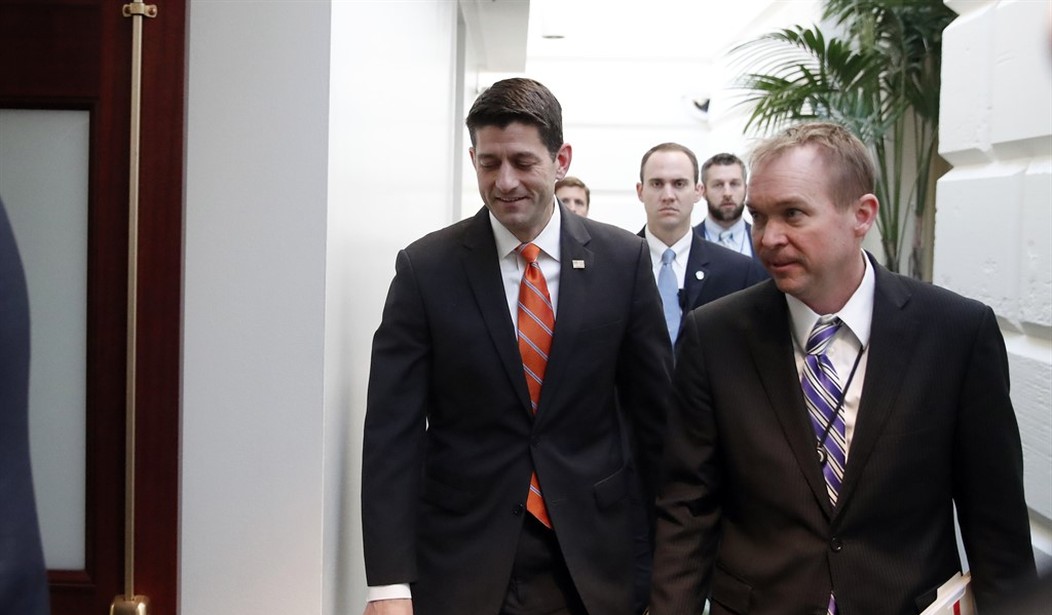Promise broken? Not exactly, but the news that the White House has committed to continuing the cost-sharing subsidies for ObamaCare won’t make voters terribly happy in a budget process that already has had its share of disappointments. The prospects of a government shutdown have dimmed considerably, though, and this may become a moot point soon:
Democrats say the White House has signaled that the cost-sharing reduction subsidy payments from Obamacare will continue even if language guaranteeing them is not included in the government funding bill.
The latest move by the White House removes a major obstacle in budget talks between Republicans and Democrats ahead of the funding deadline on Friday, and significantly lowers the odds of a government shutdown.
White House Chief of Staff Reince Priebus relayed the news to House minority leader Nancy Pelosi over the telephone today, according to Democratic aides.
How can that be? Paul Ryan promised yesterday that the subsidies would not be part of the funding bill this week, right? Well, yes … and he’s right, too. According to ABC News, the subsidies won’t be part of the funding bill, but the White House has committed to paying them anyway.
If that sounds confusing, well, it is — but it won’t be for long, the Trump administration is betting. The commitment to paying the subsidies is only temporary, perhaps only through the end of next month. By that time, the entire question of cost-sharing subsidies may have been mooted if the House can finally pass the AHCA, which will repeal much of the structure of ObamaCare and its subsidy arrangements. And right now, the prospects have improved significantly:
Not everyone’s happy about the budgetary pas de deux, however. Republicans in Congress sued the Obama administration over these payments, arguing that they were already unauthorized by statute or appropriation. This work-around will undermine their legal fight against ObamaCare, which has still not been resolved, even if the deal avoids a collapse in the insurance markets:
The solution to the row appears to be to continue the status quo: paying for the subsidies outside of the congressional spending process. That would give Trump some future leverage over Obamacare while allowing Democrats to say they’ve protected the law, if only temporarily.
And it would allow Republicans to avoid blame for causing chaos and confusion in the insurance markets.
“If we pull the subsidies … I think there would be nobody with a health insurance plan next year.” said Rep. Phil Roe (R-Tenn.).
But some Republicans slammed the White House decision, saying it undermines the party’s position in an ongoing lawsuit that the payments are unconstitutional.
The administration choosing to continue paying the subsidies without congressional approval “is both clearly illegal and unconstitutional,” Rep. Mark Walker (R-N.C.), chairman of the conservative Republican Study Committee, said in a statement.
Again, this should end up as nothing more than an academic question by the end of next month, assuming progress on the AHCA is going as advertised. The House Freedom Caucus officially endorsed the latest version of the bill yesterday afternoon, removing the main obstacle to its passage, but not the only obstacle. Pressure will now fall on moderate Republicans in both the House and Senate to unite around this bill and its changes since last month, both to finally move on the repeal of ObamaCare and to get to the next item on the agenda — tax reform. If Republicans can’t pull off a repeal, though, the Trump administration will get stuck paying these subsidies for a long while.
Update: Maybe this is just more Art of the Deal posturing, or perhaps the White House is confused (via Twitter reader GlobeTrekker):
https://twitter.com/realDonaldTrump/status/857557522584088576
Second thoughts? Subsidizer’s remorse? Stay tuned.








Join the conversation as a VIP Member